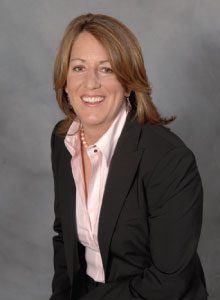These activists want you to marry!
From the courthouses of California to the halls of Capitol Hill, these women and the organizations they run are litigating, lobbying and leading the fight for marriage equality.
Kate Kendell, Executive Director, National Center for Lesbian Rights (nclrights.org)
Since its founding in 1977, the NCLR has been dedicated to LGBT family law and has helped set precedents for child custody laws, adoption rights and same-sex-partner legal recognition.
As executive director, Kate Kendell maps out long-term strategies for “where [we are] now legally in terms of the status of lesbian relationships, where we want to be, and what are the best mechanisms that we can push as a legal organization for getting there.”
Through Kendell’s leadership, combined with the hard work and skill of her staff, the NCLR has won many landmark cases, including the milestone case of Sharon Smith’s wrongful death suit on behalf of her partner, Diane Whipple. Even under the relatively progressive laws of California, Smith was seen legally as a stranger, but the NCLR successfully sued for her right to be treated as a spouse for the purposes of the suit, setting precedents for California to legally recognize same-sex partners.
Of her work at the NCLR, Kendell says, “it has been the most fantastic, privileged, rewarding work I could imagine.”
Lee Swislow, Executive Director, Gay and Lesbian Advocates and Defenders (glad.org)
A New England-based organization, GLAD has been at the forefront of marriage equality for over 25 years. The organization led the counsels that abolished sodomy laws in every state in New England, lobbied for current LGBT nondiscrimination laws, and won the right to marry in Massachusetts and form civil unions in Vermont.
As executive director, Lee Swislow oversees the planning and implementation of strategies to win equal rights for LGBT citizens. Swislow began her LGBT work as a nurse for patients with HIV and further clarified her ambition in life to bring equality and justice to her community. “Anytime you have the opportunity to fight discrimination, grab it. It’s the most personally satisfying thing anyone can do,” she says. Swislow knows that she’s fighting for her own rights too: “If it weren’t for GLAD, I wouldn’t be married.”
Lara Schwartz, Legal Director and Chief Legislative Counsel, Human Rights Campaign (hrc.org)
Federal laws like the Defense of Marriage Act significantly curtail LGBT rights. Leading a team of lawyers, Lara Schwartz coordinates messages to the Hill about the impact of proposed legislation in the LGBT community and provides information about why the HRC does or does not support particular items.
With a resume that includes clerking for a federal judge, working for two corporate law firms and being the head legal counsel on both battles against the Federal Marriage Amendment, Schwartz not only fights for marriage equality, but also works toward changing tax and hate-crime laws to protect the LGBT community.
Schwartz emphasizes the need to push for full marriage equality. “Civil unions aren’t marriage. They are a huge step forward in protecting families in very concrete ways…but they’re not full equality; they’re progress. People don’t say, ‘I want to be civil unionized when I grow up,’ they want to get married.”
Judi O’Kelley, Southern Regional Director, Lambda Legal (lambdalegal.org)
While directing the city of Atlanta’s nondiscrimination policy and serving as the lead plaintiff in the 2004–06 case to strike down Georgia’s anti-marriage amendment, Judi O’Kelley laid the groundwork for marriage equality in the South. In her position with Lambda Legal, the oldest national legal organization dedicated to achieving full equality for gay and lesbian people, O’Kelley works directly with the LGBT community of the South.
“I always feel such an astonishment and awe at the courage of [LGBT] people who are living every day in states like Mississippi and Alabama,” O’Kelley says, “especially couples who are building their lives together, having families together, and being who they are and making the best of the laws that have been dealt to them.”
What You Can Do to Make a Difference
Each of these women emphasized the effect that being out and proud has on the marriage equality movement. “Not enough people tell their stories,” Kendell says. “We assume someone will win this for us, we don’t want to risk relationships or make people feel uncomfortable by having difficult conversations.” But studies show that the extent to which people support gay rights is in direct correlation with how many gay people they know and love. “Every friend that you share your experience with, every family member that you talk with, is exponentially going to help make a change,” says Schwartz.
“If you’re not in a place where you can [be out],” O’Kelley adds, “then give support in terms of letter-writing campaigns, making donations and giving support to the people who can be.”
